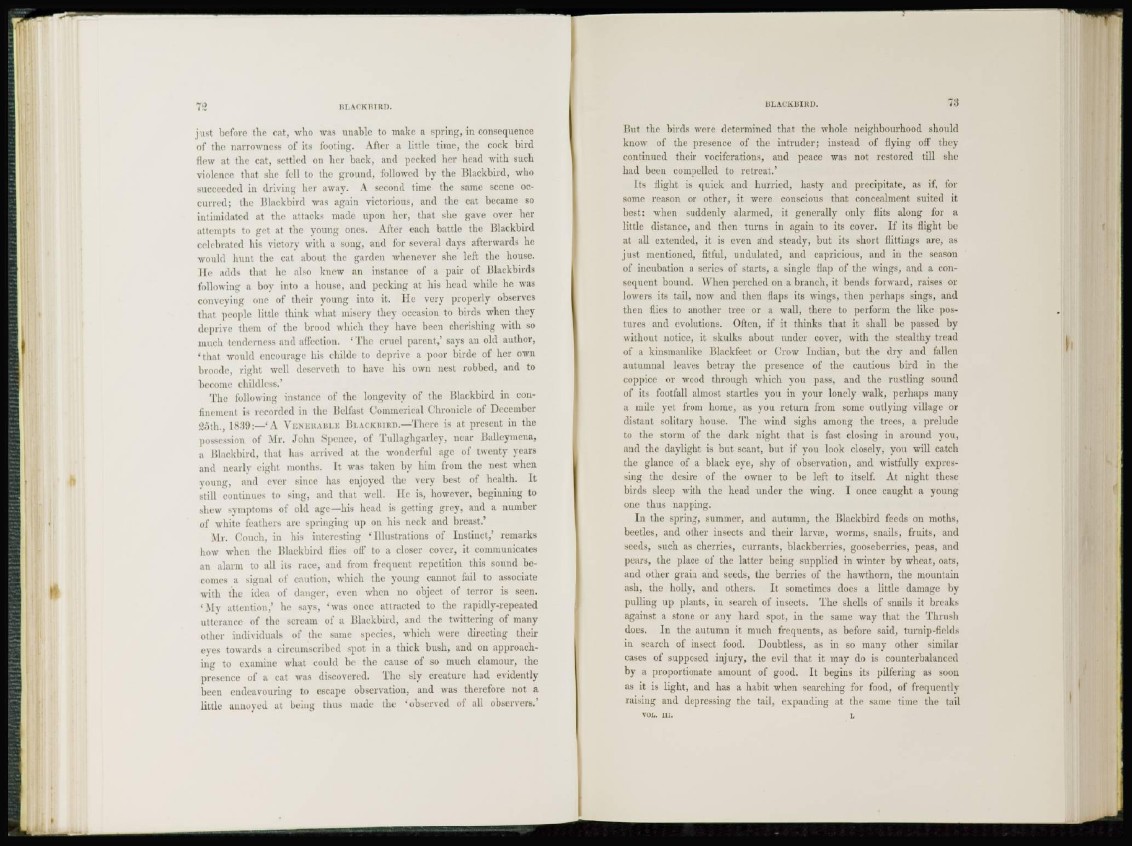
just before tho cat, who was unable to make a spring, in consequence
of the narrowness of its footing. After a little time, the cock bird
flew at the cat, settled on her back, and peeked her head with such
violence that she jell to the ground, followed by the Blackbird, who
succeeded in driving her away. A second time the same scene occurred;
the Blackbird was again victorious, and the cat became so
intimidated at the attacks made upon her, that she gave over her
attempts to get at the young ones. After each battle the Blackbird
celebrated his victory with a song, and for several days afterwards he
would hunt the cat about the garden whenever she left the house.
He adds that he also knew an instance of a pair of Blackbirds
following a boy into a house, and pecking at his head while he was
conveying one of their young into it. He very properly observes
that people little think what misery they occasion to birds when they
deprive them of the brood which they have been cherishing with so
much tenderness and affection. 'The cruel parent,' says an old author,
'that would encourage his ehihle to deprive a poor birde of her own
broode, right well deserveth to have his own nest robbed, and to
become childless.'
The following instance of the longevity of the Blackbird in confinement
is recorded in the Belfast Commerical Chronicle of December
25th., 1.S39:—'A VBHBBABLB BLACKBIRD.—There is at present in the
possession of Mr. John Spence, of Tullaghgarley, near Baileymena,
a Blackbird, that has arrived at the wonderful age of twenty years
and nearly eight mouths. It was taken by him from the nest when
young, and ever since has enjoyed the very best of health. It
still continues to sing, and that well. He is, however, beginning to
shew symptoms of old age—his head is getting grey, and a number
of white feathers are springing up on his neck and breast.*
Mr. Couch, in his interesting ' Illustrations of Instinct/ remarks
how when the Blackbird Hies off to a closer cover, it communicates
an alarm to all its race, and from frequent repetition this sound becomes
a signal of caution, which the young cannot fail to associate
with the idea of danger, even when no object of terror is seen.
' M y attention,' he says, 'was once attracted to the rapidly-repeated
utterance of the .-cream of a Blackbird, and the twittering of many
other individuals of the same species, which were directing their
eyes towards a circumscribed spot in a thick bush, and on approaching
to examine what could he the cause of so much clamour, the
presence of' a cat was discovered. 'The sly creature had evidently
been endeavouring to escape observation, and was therefore not a
little annoyed at being thus made the ' observed of all observers.'
But the birds were determined that the whole neighbourhood should
know of the presence of the intruder: instead of flying off they
continued their vociferations, and peace was not restored till she
had been compelled to retreat.'
Its flight is quick and hurried, hasty and precipitate, as if, for
some reason or other, it were conscious that concealment suited it
best: when suddenly alarmed, it generally only flits along for a
little distance, and then turns in again to its cover. If its night be
at all extended, it is even and steady, but its short nittings are, as
just mentioned, fitful, undulated, and capricious, and in the season
of incubation a series of starts, a single flap of the wings, and a consequent
bound. When perched on a branch, it bends forward, raises or
lowers its tail, now and then flaps its wings, then perhaps sings, and
then flies to another tree or a wall, there to perform the like postures
and evolutions. Often, if it thinks that it shall be passed by
without notice, it skulks about under cover, with the stealthy tread
of a hinsmaiilike Blackfeet or (.'row Indian, but the dry and fallen
autumnal leaves betray the presence of the cautious bird in the
coppice or wood through which you pass, and the rustling sound
of its footfall almost startles you in your lonely walk, perhaps many
a mile yet from home, as you return from some outlying village or
distant solitary house. The wind sighs among the trees, a prelude
to the storm of the dark night that is fast closing in around you,
and the daylight is hut scant, but if you look closely, you will catch
the glance of a black eye, shy of observation, and wistfully expressing
the desire of the owner to be left to itself. At night these
birds sleep with the head under the wing. I once caught a young
one thus napping.
I n the spring, summer, and autumn, the Blackbird feeds on moths,
beetles, and other insects and their larvse, worms, snails, fruits, and
seeds, such as cherries, currants, blackberries, gooseberries, peas, and
pears, the place of the latter being supplied in winter by wheat, oats,
and other grain and seeds, the berries of the hawthorn, the mountain
ash, the holly, and others. It sometimes does a little damage by
pulling up plants, in search of insects. The shells of snails it breaks
against a stone or any hard spot, in the same way that the Thrush
does. In the autumn it much frequents, as before said, turnip-fields
in search of insect food. Doubtless, as in so many other similar
cases of supposed injury, the evil that it may do is counterbalanced
by a proportionate amount of good. It begins its pilfering as soon
as it is light, and has a habit when searching for food, of frequently
raising and depressing the tail, expanding at the same time the tail
vol. in. l